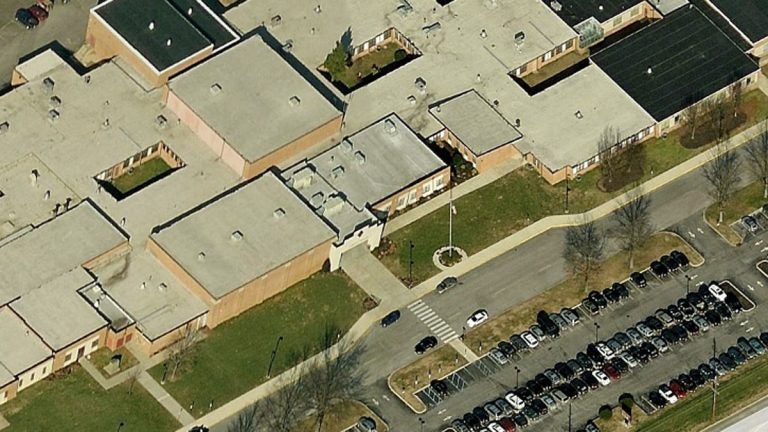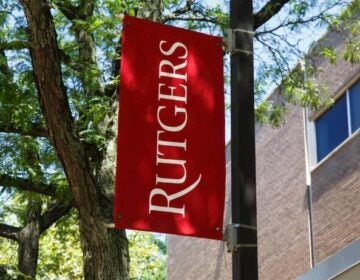South Jersey school district to sue state saying it’s been underfunded

Kingsway Regional High School is near Swedesboro
School officials in communities all over New Jersey have complained for years about state education-funding inequities, and now lawmakers are holding a series of hearings on the issue — giving clear indications that they plan to address the school-aid problems in the next state budget.
But that new spending plan won’t go into effect until July, and officials representing the Kingsway Regional School District in Gloucester County say they can no longer wait on the State House to fix a system that is shorting their students more than $11 million in state aid this year.
Instead, Kingsway regional superintendent James Lavender said district attorneys will be filing a legal brief this week with the state Supreme Court as they attempt to join a new phase of school-aid litigation that Gov. Chris Christie has been seeking to initiate since last year. But unlike Christie, who wants a complete overhaul of the state school-aid law that was enacted in 2008, the Kingsway district is instead pushing only for the invalidation of a “hold harmless” provision that for years has allowed some districts to avoid losing school aid even as others, including Kingsway, have been shortchanged.
“I can tell you, here at Kingsway, we have had enough,” Lavender said while speaking to reporters on Friday following the latest legislative hearing on school funding, which was held at his district’s high school.
“We are going to become the aggressor on this issue,” Lavender said.
The Kingsway school district (Grades 7-12) teaches students from Swedesboro, South Harrison, East Greenwich and Woolwich.
Whether the Supreme Court takes up the issue remains to be seen as it has yet to weigh in on the motion seeking to reopen school-funding litigation that was filed by the Christie administration in September. Also unclear is whether the legislative push to restore fairness in education funding will come to a full resolution by the time the fiscal 2018 budget goes into effect on July 1. Assembly Speaker Vince Prieto (D-Hudson) and Senate President Stephen Sweeney (D-Gloucester) have yet to resolve their own differences on the school-aid issue, though Sweeney is now promising to “deal with it in this budget cycle.”
And also looming is Christie, the second-term Republican who last year proposed a radical overhaul of the current school-funding formula that legislative leaders have roundly rejected. Under the state constitution, Christie has the power to use a line-item veto to change the budget that lawmakers propose. In a recent NJ 101.5 FM radio appearance he gave no indication that he’s given up a quest to make drastic changes that would shift aid from urban communities to pay for big cuts for suburban school districts.
New Jersey’s current school-aid law was enacted in 2008 by former Gov. Jon Corzine. It came as part of an effort to resolve decades of the state Supreme Court being involved in education funding to enforce the state constitution and protect the interests of students in the state’s poorest communities.
Known as the School Funding Reform Act, the 2008 law linked state aid to student need, and it also set up an “adequacy budget” for each district based on factors such as special education, English-language learners and at-risk low-income students, and the court signed off on the formula in 2009.
But perhaps the biggest problem with the implementation of the formula since it went into effect has been Christie’s decision to only partially fund the formula after taking office amid recession in early 2010. For example, the $9 billion in direct aid for school districts that’s in the current state budget is roughly $1 billion short of what the formula calls for. And given the state’s deep fiscal challenges, including the grossly underfunded public-employee pension system, immediate full funding of the school-aid formula is virtually impossible.
Also a top concern has been the way the state has provided adjustment aid to districts since the funding formula was enacted in 2008. During the first year that the SFRA went into effect, the adjustment aid was provided to alleviate drop-offs in state aid as some districts were due to see cuts. The districts were eventually supposed to be weaned off that aid, but that hasn’t happened. So together with the overall cuts to funding, now many districts are receiving more than 100 percent of their estimated state aid. By contrast, hundreds are also receiving less than 100 percent.
One of those districts that are receiving less is Kingsway Regional in Woolwich. Lavender, the superintendent, said the district is being shorted $11.6 million during the current school year. “We’re asking the Supreme Court to compel the Legislature to step in and do something, and to fund that formula the way it’s supposed to be funded and get rid of this ‘hold harmless’ provision,” Lavender said.
Officials from several other school districts also testified about similar problems during Friday’s hearing held at Kingsway, though no other district went as far as Kingsway did in promising to launch legal action.
“We need your help,” said Scott Heino, the superintendent of the Chesterfield School District in Burlington County. “Enough talk, we need action.”
After the hearing, Sweeney said he is anxious to resolve his disagreements with Prieto and take action on the school-funding issue by the time the fiscal 2018 budget is enacted in early July. Sweeney has already put forward a plan that would see adjustment aid reduced while at the same time adding $100 million in new dollars to the school-funding formula on an annual basis over five years. His plan would also allow some new aid for districts with increasing enrollment to make up for underfunding in districts with growing enrollment.
“We’re going to deal with it in this budget cycle,” said Sweeney, who chaired Friday’s hearing. “It’s not going away, and I’m not willing to let another cycle go exactly the way it is right now.”
But in the Prieto-led Assembly, another set of school-funding hearings are being held, with the next scheduled for Wednesday in Hackensack. And Prieto has maintained that it’s important to first hear from “stakeholders and the public” before coming up with any specific solution to the inequity problem.
“No part of the current school-funding formula should be off limits,” Prieto said. “Any real look at school funding would look at all problems and issues that have arisen, as well as demographic changes and changes in the fiscal conditions of school districts.”
But there is one area where the two Democratic leaders have been able to find common ground. They both firmly oppose the school-aid plan put forward last year by Christie, which would establish a uniform, $6,599 in aid per-pupil to provide big property tax cuts to suburban communities at the expense of less wealthy and urban communities.
“I’m open to anything other than the governor’s plan,” Prieto said.
_______________________________________________________
NJ Spotlight, an independent online news service on issues critical to New Jersey, makes its in-depth reporting available to NewsWorks.
WHYY is your source for fact-based, in-depth journalism and information. As a nonprofit organization, we rely on financial support from readers like you. Please give today.




